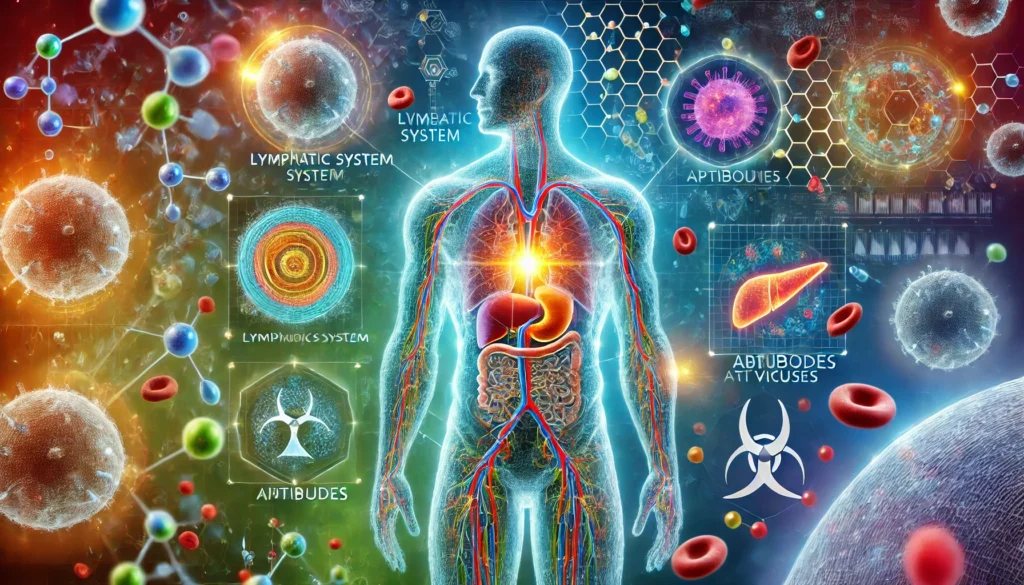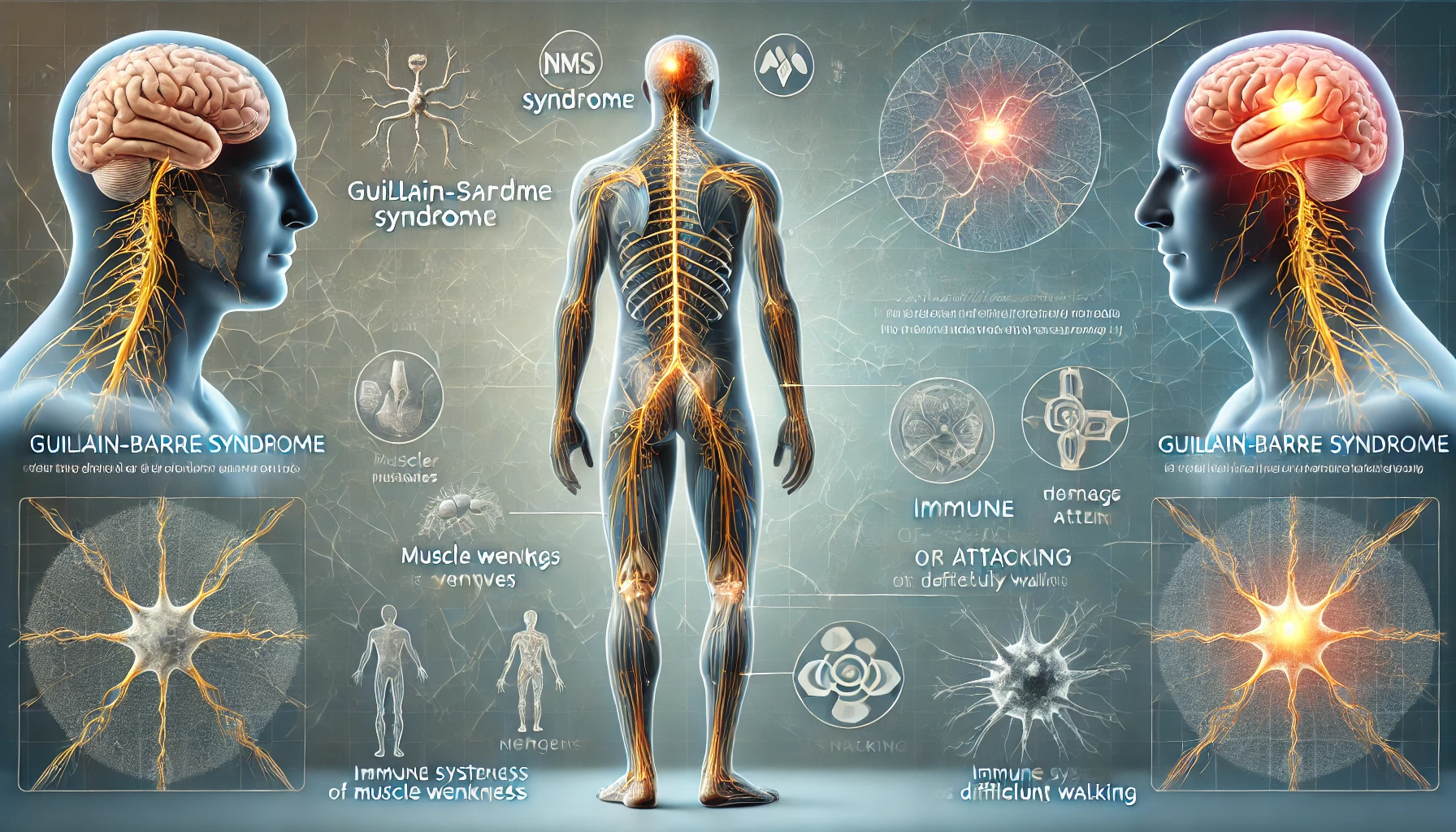Description
Guillain-Barré Syndrome (or GBS) represents an uncommon but potentially crippling autoimmune disease that affects the peripheral nervous system. It is caused by the immune system attacking the myelin sheath surrounding the nerves, resulting in weakening, numbness, and, in extreme situations, paralysis. Although the exact origin of GBS is yet unknown, infections are frequently the catalyst. Usually, it begins in the extremities with tingling and weakness that progresses over time. The immune system unintentionally attacks peripheral nerves in an attempt to fight the infection, damaging the myelin sheath or the nerve fibers. This leads to a disruption in nerve signals, which causes pain, weakening in the muscles, and even paralysis in extreme situations.
You May Also Like:
Chronic autoimmune urticaria: Description, Causes, and Treatment Protocol
CREST syndrome | Limited cutaneous systemic sclerosis: Description, Causes, and Treatment Protocol
Guillain-Barré syndrome (GBS): Description, Causes, and Treatment Protocol is an original (MedNewsPedia) article.
Possible Causes
While the exact cause of GBS is not always clear, several factors are believed to have contributed to its development. The main causes of the onset of GBS include the following:
Immune System Response: Certain vaccinations or infectious agents may contain chemicals that resemble those in nerve cells. Due to these similarities, the immune system may unintentionally target the nerves when attempting to combat an illness or reacting to a vaccination.
Genetic Predisposition: Some people may be predisposed to develop GBS following an infection or immunological response due to genetic differences or predispositions.
Infections: These can be:
Bacterial Infections
Campylobacter jejuni, which is frequently obtained through contaminated food, particularly undercooked poultry, is the most frequently related bacteria to GBS. GBS may also be preceded by other bacterial illnesses such as Haemophilus influenzae and Mycoplasma pneumoniae.
Viral Infections
GBS has been linked to specific viral infections. These viruses include Zika virus, influenza virus, cytomegalovirus (CMV), and Epstein-Barr virus (EBV). Peripheral nerves may unintentionally be attacked by the immunological response that is produced to fight these infections.
Other Possible Triggers: A very low possibility of contracting GBS has been linked to some immunizations, most notably the influenza vaccine, though this is rare.
Other Factors: These are:
Gastrointestinal disorder
Acute gastrointestinal issues, especially Campylobacter infections, can occasionally occur before GBS symptoms manifest.
Stress or Surgery
Although the precise cause of GBS cases is yet unknown, cases have been documented after major stress or surgery.
Exacerbating and Mitigating Factors
Numerous factors can either worsen or help reduce the severity or course of GBS, making it a complex disorder. The following are a few factors that may aggravate or alleviate GBS:
The exacerbating factors include:
Immune Overreaction: Occasionally, an excessively forceful immune reaction to an infection may result in a more serious attack on one’s peripheral nerves, intensifying the symptoms of GBS.
Viral or Bacterial Infections: The cytomegalovirus (CMV), Zika virus, Epstein-Barr virus (EBV), Campylobacter jejuni, and influenza are among the diseases that can induce or intensify GBS symptoms.
Delayed Identification or Treatment: GBS symptoms may worsen and perhaps progress if a diagnosis or course of treatment is neglected.

Medical Complications: These involve:
Autonomic Dysfunction
An irregular heartbeat, unstable blood pressure, and other problems can result from GBS’s occasional effects on the autonomic nervous system.
Respiratory Complications
A respiratory failure that requires ventilator support can arise from severe weakening of the respiratory muscles.
The mitigating factors include:
Rehabilitation and Supportive Healthcare Services: These comprise:
Physical Therapy
Maintaining muscle strength, function, and mobility through early physical treatment and subsequent rehabilitation may help speed up recovery.
Respiratory Assistance
For patients who are experiencing respiratory muscle weakness, prompt intervention with respiratory assistance helps avoid problems.
Early Infection Treatment: If a bacterial infection such as Campylobacter jejuni is the cause of GBS, early antibiotic treatment may decrease the likelihood and severity of GBS development later on.
Healthy Lifestyle Choices: Following a healthy diet, getting enough sleep, and avoiding recognized irritants can all help to strengthen the immune system.
Stress Management: Methods or approaches for reducing stress may be useful in controlling symptoms and encouraging healing.
Prompt Medical Intervention: The severity and course of GBS can be lessened by early symptom diagnosis and the timely initiation of medical treatment, like IVIG therapy or plasma exchange.
Patient Supervision and Guidance: It is possible to intervene quickly and control possible exacerbations when symptoms, health indicators, and consequences are routinely monitored.
Standard Treatment Protocol
A combination of medicinal treatments and supportive care are used in the conventional GBS treatment strategy to control the illness and promote healing. The common procedures in the GBS treatment regimen are as follows:
Medical Interventions: These include:
Plasma Exchange (Plasmapheresis)
The process of plasma exchange entails the extraction of antibodies and other possibly hazardous proteins from blood plasma. It functions by substituting donor plasma or a protein solution for the patient’s plasma. This procedure lessens the damaging reaction of the immune system and aids in the removal of antibodies that are assaulting the nerves. Usually, multiple sessions, each lasting a few hours, are used to give plasma exchange.

Intravenous Immunoglobulin (IVIG) Therapy
High dosages of immunoglobulins, the antibodies made from donor blood, are given as part of IVIG treatments. By inhibiting the damaging attack on the nerves, IVIG helps regulate the immune system. The course of treatment for IVIG varies according to the extent of the ailment and is usually administered over several days.
Supportive Care: These incorporate:
Breathing Aid
In severe GBS cases, respiratory muscle weakness may develop, necessitating mechanical ventilation to support breathing. Monitoring and support for intensive care are given to address respiratory problems.
Physical Treatment and Rehabilitation
By preserving muscle mass, avoiding joint stiffness, and promoting healing, physical therapy is essential for the management of GBS. According to each person’s requirements, rehabilitation frequently begins during the acute period and lasts through the recovery phase.
Pain Management
This covers painkiller medicines. To treat the pain and suffering brought on by GBS, doctors may prescribe non-steroidal anti-inflammatory medicines (NSAIDs), acetaminophen, or opioids.
Observation and Assistance: These involve:
Regular Monitoring
GBS patients need to have their symptoms, medical conditions, and complications closely monitored, especially in their acute stage.
Nutritional Support
Feeding and swallowing issues resulting from muscle weakness can be addressed, along with nutritional demands.
Psychological Help: GBS can present emotional difficulties. It may be suggested that patients and their family members receive emotional assistance, counseling, or therapy to assist them in managing the psychological effects of the disorder.
Post-Acute Care and Recovery: Follow-up care is part of this. Continued rehabilitation following the acute phase may help with recovery and enhance functionality. This may include speech, occupational, and physical therapy.
Close Observation for Possible Complications: Individuals with GBS are constantly monitored for any side effects, including blood clots, infections, and autonomic disturbances.
Individualized Treatment Strategies: The individual symptoms, intensity, and responsiveness to therapy of each patient are considered while formulating treatment programs.

Treatment Options
Several adjunct therapies, including pharmaceuticals, supplements, and alternative techniques, may be taken into consideration to assist in managing symptoms and encourage recovery alongside the usual plan for treating Guillain-Barré Syndrome (or GBS). These are some more GBS therapy possibilities:
Medications: These include:
Corticosteroids
In certain circumstances, corticosteroids may be taken into consideration to lessen nerve irritation. Their usefulness in treating GBS is still debatable and unclear. They are not covered by the typical course of care.
Pain Relievers
Nonsteroidal anti-inflammatory medicines (NSAIDs) and acetaminophen, both available over-the-counter, can help control mild to moderate pain related to GBS.
Nutritional Supplements: These are:
Vitamin B12
Supplementation with vitamin B12, which is necessary for nerve function, may help with nerve regeneration.
Vitamin C
The antioxidant, vitamin C, is well-known for strengthening the immune system and maybe aiding in nerve regeneration.
Omega-3 Fatty Acids
These fatty acids, which are present in fish oil, may promote nerve function and minimize inflammation due to their anti-inflammatory qualities.
Herbal and Natural Remedies: These comprise:
Turmeric/Curcumin
Nerve inflammation may be decreased by turmeric, particularly its active ingredient, curcumin, which has anti-inflammatory properties.

Ashwagandha (Withania somnifera)
The immune system and stress management may be aided by ashwagandha’s widely recognized adaptogenic properties. It appears to have anti-inflammatory properties that may help lower inflammation.
Physical and Allied Health Practices: These consist of:
Physical Therapy
Consistent physical treatment promotes healing by preserving muscle function, strength, and mobility. The patient’s demands and abilities should be considered when designing the therapy.
Occupational Therapy
This method enhances independence during rehabilitation by concentrating on modifying activities and enhancing daily living abilities.
Acupuncture
Some people find that acupuncture, which entails inserting tiny needles at particular body sites, helps them manage the symptoms of GBS. Its effectiveness in treating GBS is debatable and may differ from person to person.
Yoga/ Tai Chi
These exercises could help patients recover by preserving their power, flexibility, and mental calm. When performing these tasks, the patient’s capacities and constraints should be considered.
Although several herbal and natural therapies have qualities that could potentially help with GBS symptoms, there is not sufficient evidence to support their specific effectiveness for GBS. They should be used with caution, along with conventional GBS medical therapies, and under the supervision of healthcare professionals.
Conclusion
Guillain-Barré Syndrome (GBS) is a rare yet potentially debilitating autoimmune disorder that demands timely diagnosis, targeted treatment, and comprehensive supportive care. While its exact cause remains unclear, GBS is often triggered by infections, immune dysregulation, or other underlying factors. Standard treatment protocols, such as plasma exchange and intravenous immunoglobulin (IVIG) therapy, play a critical role in managing the condition and promoting recovery. Adjunct therapies, including physical rehabilitation, nutritional supplements, and alternative approaches, can further support nerve regeneration and symptom management. As each patient’s experience with GBS is unique, personalized treatment plans that address individual needs are essential for achieving optimal outcomes. Ongoing research into GBS continues to offer hope for improved therapies and a better understanding of this complex disorder, emphasizing the importance of an integrative and patient-centered approach to care.

Additional resources for further reference
https://www.ninds.nih.gov/health-information/disorders/guillain-barre-syndrome
https://www.nature.com/articles/s41582-019-0250-9
https://jamanetwork.com/journals/jama/fullarticle/2801220
https://www.sciencedirect.com/science/article/abs/pii/S1568997216302178
Important Note: The information contained in this article is for general informational purposes only, and should not be construed as health or medical advice, nor is it intended to diagnose, prevent, treat, or cure any disease or health condition. Before embarking on any diet, fitness regimen, or program of nutritional supplementation, it is advisable to consult your healthcare professional in order to determine its safety and probable efficacy in terms of your individual state of health.
Regarding Nutritional Supplements Or Other Non-Prescription Health Products: If any nutritional supplements or other non-prescription health products are mentioned in the foregoing article, any claims or statements made about them have not been evaluated by the U.S. Food and Drug Administration, and such nutritional supplements or other health products are not intended to diagnose, treat, cure, or prevent any disease.


